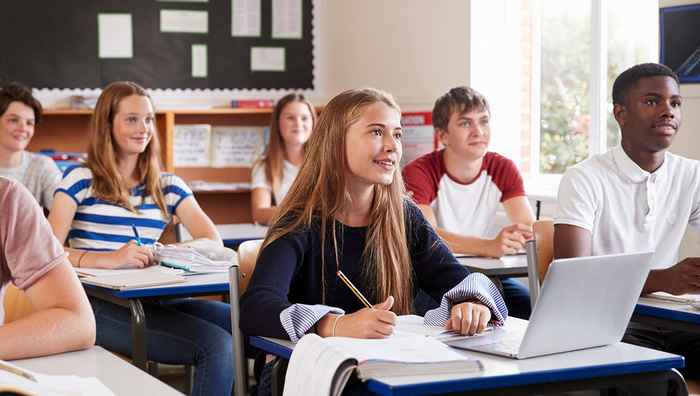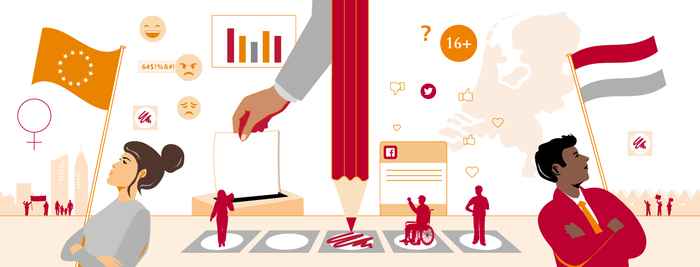What is the role of education in developing citizenship competencies?
26 October 2023

Since 2006, Dutch schools have been obliged to offer citizenship education. Anke Munniksma and Remmert Daas, from the Educational Sciences program group at the University of Amsterdam, conduct research into this type of education and the citizenship competencies of young people. One of their projects is the International Civic and Citizenship Education Study (ICCS), in which the Netherlands has been participating since 2009. This study examines the knowledge, attitude and behavior of second-year students of high school and the content of citizenship education.
What should students learn through citizenship education?
In citizenship education, students must learn how to live in a free, democratic country, with respect for others. 'Citizenship education is about knowledge, attitude and skills,' Daas explains. 'For example, students must learn the difference between the Senate and the House of Representatives, practice democratic activities, but also learn to listen to each other's opinions and deal with people who differ from them.' 'There is therefore both a political and social component to this type of education,' Munniksma adds.
Why is this mandatory, did something go wrong?
'The attention to citizenship education is part of a longer development and reached the public around the 1990s. The social and emotional development of children received increasing attention in those years, especially due to the increasing cultural diversity in society and major concerns about social cohesion. Children had to learn how to behave democratically in a diverse society. The term “citizenship” gradually emerged and it became a legal task for schools to pay attention to this,' Daas explains.
What are the effects of citizenship education so far?
'Citizenship education is struggling to get started at many Dutch schools and has stagnated,' says Munniksma. 'The Netherlands participated in the International Civic and Citizenship Education Study (ICCS) and the study showed that the competencies of students, including their democratic knowledge and voting intentions, and the implementation of citizenship education lagged behind comparable countries.'
Daas and Munniksma mention that the important explanation is that the law is too non-binding and that there is a lot of uncertainty for schools about how to provide the education. This was also noted by former minister Slob, who tightened the citizenship law in citizenship education in 2019. This means that from August 2021, schools must have a clear vision of citizenship education and must implement this in a targeted manner in all years. 'Schools now have a better idea of what is expected from them. Although, in addition to a tightened citizenship assignment, attention will also have to be paid to educating teachers to be able to shape this properly," says Daas.
Too much differentiation gets in the way of citizenship education
In addition to a law that is too non-binding, according to Daas and Munniksma, early selection in the Dutch school system has a negative impact on the goals of citizenship education. 'From the citizenship mission, schools are seen as a place where students can practice social skills that are necessary to participate in the pluralistic society,' Munniksma explains. 'Diversity within classes is important, because it is in diverse groups that students can learn to engage in discussion and exchange ideas with scholars from different backgrounds. But, students with less educated parents and students with a migration background are still overrepresented at VMBO, and underrepresented at HAVO and VWO. This limits the extent to which discussion and exchange and bridging differences can be practiced. If we want to promote social cohesion in society through citizenship education, we must also pay attention to the consequences of this early selection.'
The upcoming elections
Now that the elections are just around the corner, the question is: what are the voting intentions of young Dutch people? At the last House of Representatives elections, the youth turnout of 80% was a significant increase from the previous elections (67%). In the last municipal elections, less than half of young citizens completed a ballot: 43%. “Because young people often vote for different parties than older people, higher participation by young people could make a difference to the election results,” Munniksma continues. 'That is why there have been various initiatives in recent years to get young people to vote. From our research we know that citizenship education, by organizing democratic activities at school, can also contribute to young people's intentions to vote. '
November 28
On November 28, a week after the elections, the findings of a new ICCS round will be published. Remmert Daas looks forward: 'In the new findings we learn more about the political involvement of young people. Very interesting to see the current state of citizenship among this target group.'
